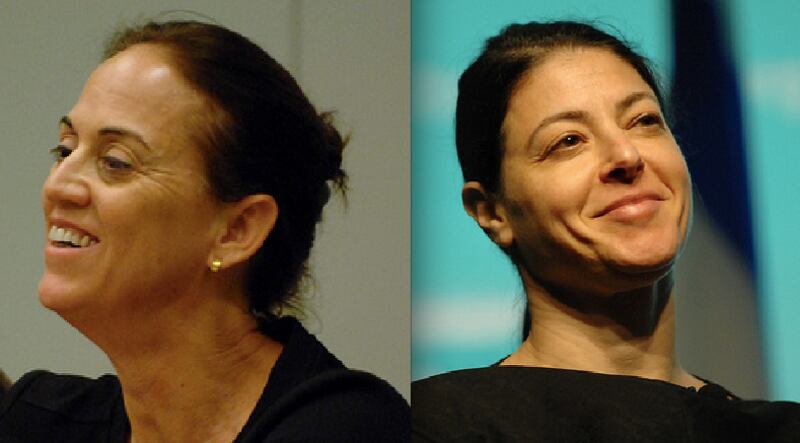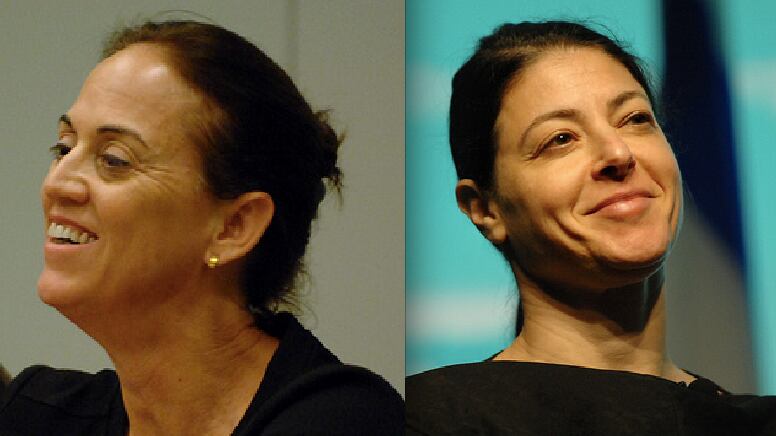Israeli parliamentarians Ruth Calderon and Merav Michaeli provided a rare window into the feminist debate within the Knesset at a panel on “The Changing Face of Politics in Israel: Will Women Lead the Way?” at J Street’s national conference in D.C. on Monday.
The all-female panel included Robi Damelin of The Parents Circle and Yael Patir of J Street, who supplied welcome and important comments on the role of Palestinian women. But it was Calderon and Michaeli who really stole the show. Their verbal sparring made clear that, though both have a vested interest in pushing a feminist agenda in the Knesset, they have very different ideas as to how to go about it.

Michaeli started out by saying that the Knesset is a boys’ club, just like the media and other institutions. True, there are more women than ever before in the current parliament, but they still only hold 27 out of 120 seats. Because she believes it’s important for them to have a forum where they are the majority, Michaeli created a women’s caucus, which all 27 MKs joined. “I feel there is a basic sense of solidarity between the female MKs,” she said. “We tend to support one another’s initiatives.”
But she then went on to describe a time when that solidarity failed to materialize. MK Hanin Zoabi, a female Arab parliamentarian who is much reviled among Israeli Jews, had proposed a bill to promote gender parity in Israel’s political parties. To Michaeli’s shock, many of the other female MKs chose not to endorse it. She recalled members of the Meretz party yelling, “How can you possibly not support this legislation?” and one of the members from Yesh Atid—Calderon’s party—answering, “Don’t be so angry, we’re working on a similar bill ourselves, we’re just not going to vote for Zoabi’s legislation.”
Calderon dismissed Michaeli’s shock with two words: “That’s bullshit.” (Bless that Israeli disregard for political correctness!) “It was a good cause, but there was a question in my party of, do we want to support them doing this or do we want to do it ourselves?”
Underlying that question is another one, which seems likely to plague every feminist in the Knesset at some point or other: What do you do when a women’s rights issue conflicts with party politics?
In this case, Calderon said, she believed that Yesh Atid was better placed to get such a bill passed because they have the broad support that Zoabi lacks. But she also pointed out that good causes like this one will sometimes get subordinated to party politics, and that’s normal. “The political game doesn’t stop” just because it’s a woman who’s proposing a piece of legislation, or because that legislation will empower women, she said.
While Calderon is interested in cultivating relationships with individual women MKs—she struck up a friendship with Zoabi by making a point of asking her name, sitting with her so she wouldn’t be lonely, and even bringing her pillows to make her office couch more comfortable—Michaeli seems to put a higher premium on expressing solidarity in the legislative arena. Note that Zoabi’s isn’t the only woman’s bill she’s supported recently. She also endorsed a bill by MK Orit Struck, of the far-right Habayit Hayehudi party, designed to extend Israeli labor law to the West Bank and protect women workers there. That sounds like a natural move for a liberal feminist like Michaeli—until you realize that Struck’s bill can be read as a de facto annexation of the West Bank and serve as a dangerous legal precedent to entrench the occupation. For Michaeli, the fact that the proposed legislation would protect women’s rights seems to have trumped that risk.
All of which illustrates another question likely to plague feminists in the Knesset: What do you do when a women’s rights issue conflicts with other liberal causes, like fighting the occupation?
If Calderon and Michaeli’s debate proved they diverge on questions like these, it also proved there are plenty of points where they converge. The funniest example came when Calderon put a pause in the panel proceedings to ask if the air conditioning in the room could be lowered. She pointed out that men always wear suits to conferences, so they don’t tend to run cold, but the same doesn’t apply to her as a woman. At which point Michaeli jumped in and excitedly agreed that air conditioning—air conditioning!—is actually a gender issue. (In fact, she’s written a Haaretz column making just this point.)
It was a good reminder that, though there may not be any kind of tactical consensus among the Knesset’s feminists, the fact that gender discrimination inflects every aspect of daily life—right down to A/C settings—means there’s clearly more uniting these parliamentarians than dividing them.






